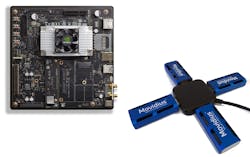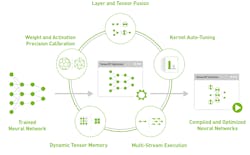There are a number of machine learning (ML) architectures that utilize deep neural networks (DNNs), including AlexNet, VGGNet, GoogLeNet, Inception, ResNet, FCN, and U-Net. These in turn run on frameworks like Berkeley’s Caffe, Google’s TensorFlow, Torch, Microsoft’s Cognitive Toolkit (CNTK), and Apache’s mxnet. Of course, support for these frameworks on specific hardware is required to actually run the ML applications.
Each framework has advantages and disadvantages. For example, Caffe is an easy platform to start with, especially since ones of its popular uses is image recognition. It is also fast and often the first framework supported by hardware. TensorFlow tends to be easier to deploy with simpler model definitions, as well as better support or GPUs. There are also accelerators specifically designed for TensorFlow like Google’s TensorFlow Processing Unit (TPU). It also handles multiple machine configurations better.
Two platforms that support TensorFlow are NVIDIA’s Jetson TX2 and Intel’s Movidius chips (Fig. 1). Intel’s TensorFlow support for Movidius is new. It addresses the range of Movidius chips that have been used in DJI’s SPARK drone for tracking user gestures visually for real-time control of the system. The Movidius Neural Compute Stick Software Development Kit (SDK) now supports TensorFlow as well as Caffe frameworks.
NVIDIA has also added native support for TensorFlow in its latest TensorRT 3 release. TensorRT 3 is part of the NVIDIA Deep Learning SDK. TensorRT is an inference accelerator for NVIDIA GPUs that provides orders of magnitude of performance improvement for inferencing and supports most common frameworks. (Fig. 2). The SDK actually includes a number of other tools such as the cuDNN deep learning primitives; the cuBLAS GPU -accelerated BLAS linear algebra libraries, and the cuSPARSE sparse matrix operations library.
In addition, NVIDIA’s DeepStream SDK with a C++ API and runtime for GPU-accelerated transcoding and deep learning inference is now available.
The NVIDIA SDK also supports the Multi-GPU Communication through NCCL that is designed to link up to eight GPUs and NCCL2 that enables multi-GPU multi-node configurations for scaling deep learning training. NVIDIA’s SDK supports Caffe, Chainer, DL4J, Keras, Microsoft CNTK, MatConvNet for MATLAB, mxnet, Minerva, Purine, Theano, and Torch. Developers might also want to check out the NVIDIA Deep Learning GPU Training System (DIGITS). DIGITS 6 supports several frameworks, including TensorFlow, and has a pre-trained UNET model.




